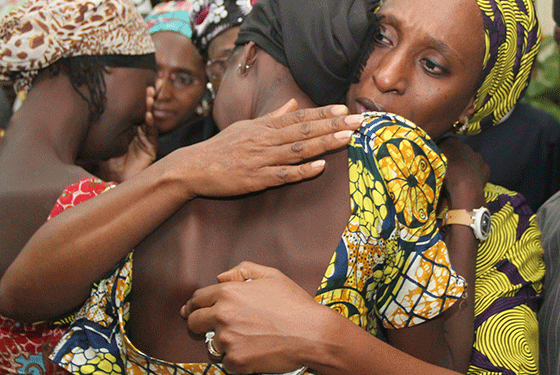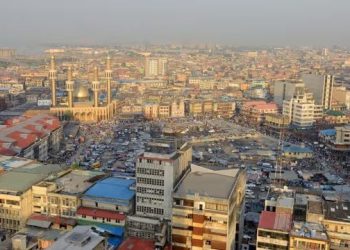The kidnapping of 276 Schoolgirls from Chibok, Nigeria by Boko Haram in April 2014 shocked the world, leading to the initiation of the global #BringBackOurGirls campaign.
A decade later, the story continues to resonate, this is courtesy of the relentless effort of CNN’s Stephanie Busari, who has dedicated ten years to keeping this critical issue in the public eye.
On the tenth anniversary of the abductions, Busari returned to Chibok highlighting the continuing impact of this tragedy on girl’s education and gender inequality in Nigeria.
Sunday, April 14, 2024, made it 10 years since the infamous abductions. For Ishaya, now 27, the memory remains all too vivid and painful. In late March, she traveled 260 kilometers (about 161 miles) with CNN, back to her old school, hoping to lay the ghosts of her past to rest. Determined to further her education, Ishaya enrolled at the American University of Nigeria in Yola, studying Communication and Multimedia Design.
For northern Nigeria, little has changed. Kidnappings have continued unabated and, as CNN learned, the ongoing violence has cast a long shadow over education – of girls in particular – further limiting the possibilities in a part of the country already marked by vastly higher rates of poverty, illiteracy in girls and child marriage.
Paying With Your Life To Be Educated
The name Boko Haram, in Hausa, translates roughly to “Western education is forbidden,” reflecting the Islamist militants’ ideological opposition to secular education, particularly for girls. The abduction of the Chibok girls remains the highest profile example of the group’s targeting of schools, but it represents only a fraction of the attacks on learners and educational institutions carried out.
From February 2014 to December 2022, as per data provided by the international non-governmental organization, Save the Children, there has been a continuous occurrence of school raids in Nigeria. Although the majority of these incidents have taken place in the northwest region of the country, the impact has been devastating for students, teachers, and school staff. Disturbingly, a total of 1,743 individuals have been abducted, close to 200 lives have been lost, and 25 school buildings have been destroyed.
While boys’ schools have not been spared from the scourge of violence, girls’ education remains particularly vulnerable because girls in this region, who are already lagging behind their peers in other parts of the country, are being directly targeted.
Nigeria School Attacks And Its Occurrence Mainly In Low-Income North
Violence against schools in northern Nigeria has escalated since the Chibok abductions in April 2014. Save the Children has confirmed an additional 69 incidents from February 2014 to December 2022. In total, 1,680 girls and boys, along with 60 teachers and school staff, have been abducted, and 184 students and 14 staff members have lost their lives.
Improvement Of Girl’s Enrollment In School In Northern Part Of Nigeria
Girls’ school enrollment in northern Nigeria has shown progress in the past ten years. However, a recent survey conducted by Nigeria’s National Bureau of Statistics and UNICEF in 2021 revealed that more than half of women aged 15-49 in the northeastern and northwestern regions were illiterate with no formal education. This is in stark contrast to the less than 1% illiteracy rate in the southeast and 7% in the southwest. Moreover, about half of girls in the northeast and approximately 40% in the northwest were not enrolled in primary or lower secondary schools, while the percentage was less than 10% in the southern states.
These figures are of significance for Nigeria because, as the survey notes, literacy “is often seen as a proxy measure of social progress and economic achievement.” But they also matter for the rest of the continent and beyond. By 2030, Nigeria will have “17% of the children in Africa and 5% of the children in the world,” according to UNICEF. As the UN children’s agency put it: “Nigeria’s child population is large and growing… What happens to children in Nigeria matters significantly to regional and global development.”
“We know that when we educate women, that has a multitude of returns and economic growth,” Executive Director of the Global Coalition to Protect Education from Attack (GCPEA), Lisa Chung Bender told CNN. “Educating women is the best return on investment that any country can make. If Nigeria wants to advance… the best investment [is] getting all girls into school and having them stay in school through completion.”
The GCPEA, among other things, monitors and works to end impunity for attacks on education. Of the situation in northern Nigeria, Bender noted that attacks have “really intensified.” The prevailing insecurity, she told CNN, erodes families’ trust in sending their children to school.
Choosing to persist with educating girls despite the very real risks can also have a psychological impact on parents, according to Oby Ezekwesili, former Nigerian education minister and one of the leaders of the Bring Back Our Girls movement.
“Mothers used to be the ones who insisted… ‘our daughters should go to school,’” Ezekwesili told CNN. “But guess what the Chibok girls tragedy did? It made the mothers feel guilty… in their mind that what they did by arguing for education for their daughter was to say, ‘pay with your life to be educated.’”
As for learners and teachers, the 2023 report by Save the Children found that despite the lack of “specific research on learning outcomes… schools and government officials reported massive withdrawal of learners from schools by parents. Teachers as well are also reported to be resigning or simply abandoning the profession in huge numbers.”
A “continuing fear of harm on learners, teachers and parents alike is palpable,” the report adds.
Today, The Challenges Facing Girls’ Education Have Increased Significantly.
According to UNICEF, “In March 2021, no fewer than 618 schools were closed in six northern states (Sokoto, Zamfara, Kano, Katsina, Niger, and Yobe) over the fear of attack and abduction of pupils and members of staff.”
In addition, over the past decade, the risks for learners have also multiplied beyond insurgent attacks.
The climate crisis has become a threat to girls’ education as extreme weather events – such as floods and landslides – have made some schools inaccessible or classrooms unsafe.
Criminal organizations have taken advantage of the vulnerabilities exposed by extremist factions, resulting in the escalation of violence in northcentral Nigeria and the emergence of a kidnapping-for-ransom sector, as reported by Save the Children. Out of the 28 school attacks scrutinized by the NGO from April 2014 to January 2021, the vast majority (23) were carried out by armed bandits, motivated by financial gain and exacerbated by high levels of unemployment, particularly among the youth.
As a consequence, the trend of kidnappings persists, with little attention being shed on the issue. On March 7, over 100 students, predominantly girls were reportedly abducted by criminal gangs from a school in Kuriga, located in northwest Nigeria. Just two days later, 15 more children were taken from a boarding school in Sokoto state, also in the northwest, according to Human Rights Watch.
As the attention has waned, so too, experts say, have the efforts of the Nigerian government to seek a long-term solution to protect the country’s school children and teachers, and ensure continued safe access to education.
The Safe Schools Declaration (SSD), an international commitment to protect educational institutions during armed conflict, was launched in 2015 and ratified by Nigeria in 2019. The declaration is just one of several policies and programs introduced or adopted by multiple Nigerian administrations, and the country has launched a national plan for financing safe schools, but positive results are yet to be seen, especially in rural areas, Bender told CNN.
“What happened at Chibok 10 years ago should have served as a lesson for the Nigerian authorities to put in place measures to protect schools and prevent mass abductions,” Amnesty International’s Isa Sanusi told CNN. Instead, Sanusi, who is the country director for Nigeria, said: “The authorities failed to learn from that horrific incident as more and more schools [have been] attacked and children abducted, with many still in the custody of gunmen.”
Nigerian Activist, Aisha Yesufu
Aisha Yesufu, a Nigerian activist, and co-convener of the Bring Back Our Girls movement echoed Sanusi’s words: “The Chibok kidnappings alone should have brought the nation together to say, ‘Enough is enough’ but unfortunately, we didn’t.”
Speaking to what she says is the hypocrisy of a government that, on the one hand, wants to improve enrollment but on the other does not protect children from harm when pursuing education, Yesufu shared an anecdote: “One of the Chibok parents said in 2014 that the government used to fine them for not sending their children to school. She asked: ‘Who is going to fine the government?’”
What Is The Nigeria President Doing About The Abductions?
The incumbent president, Bola Ahmed Tinubu, who assumed office last year, has been advocating for the resolution of the nation’s security challenges. In March, he declared that his government is implementing comprehensive plans to guarantee the safety of our schools as centers of learning, rather than places for reckless abductions.










